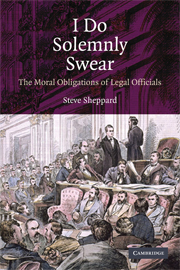Book contents
- Frontmatter
- Contents
- Preface: Moral Officials, Retail Justice, and Three Caveats
- Acknowledgments
- Introduction: Seven Questions about What Is Fit for an Official to Do
- 1 Law and Office
- 2 The Stakes: The Interests of Others in Official Actions
- 3 Officials' Obligations Arise from More Than the Law Alone
- 4 The Moral Obligations of Legal Officials
- 5 Patterns of Relationship between Legal and Moral Obligations
- 6 Breaching Obligations
- 7 Tools for the Trade: Maxims and Fallacies
- Epilogue: What the Official Ought to Do: Law and Justice
- Appendix: Taxonomy of Headings: The Lawes and Libertyes of Massachusetts (Discussed in Chapter 1)
- Index
Preface: Moral Officials, Retail Justice, and Three Caveats
Published online by Cambridge University Press: 05 June 2012
- Frontmatter
- Contents
- Preface: Moral Officials, Retail Justice, and Three Caveats
- Acknowledgments
- Introduction: Seven Questions about What Is Fit for an Official to Do
- 1 Law and Office
- 2 The Stakes: The Interests of Others in Official Actions
- 3 Officials' Obligations Arise from More Than the Law Alone
- 4 The Moral Obligations of Legal Officials
- 5 Patterns of Relationship between Legal and Moral Obligations
- 6 Breaching Obligations
- 7 Tools for the Trade: Maxims and Fallacies
- Epilogue: What the Official Ought to Do: Law and Justice
- Appendix: Taxonomy of Headings: The Lawes and Libertyes of Massachusetts (Discussed in Chapter 1)
- Index
Summary
This book examines a very basic idea: Officials must be moral, not just legal. In other words, legal officials ought to carry out their offices according to moral obligations, not just narrowly defined legal rules.
This idea is not popular in the United States: many people do not believe it, and many more are scared by it. In the media and cafe discussion, the idea spooks the left, who think it is code for religious judges, school boards, and legislators to stealthily bend the law to ban abortion, lead forced prayer in schools, arrest homosexuals, and tax the poor while ending liberty, community, and rights. And it scares the right, who think it is code for liberal feminist Black activists, who will coddle terrorists, immigrants, homosexuals, and the homeless while trampling freedom, property, and rights. Both the left and the right worry about a White House claiming ever greater powers, not least through a perpetual wartime license, using the language of moral certainty.
Meanwhile, academics and lawyers mistrust the whole idea of morality, in particular the idea of morality in the law. American society has changed from the days when Abraham Lincoln could argue with Stephen Douglas that the very bases of the law must be moral. We don't trust “morality” until we know whose morality is under discussion. Morality is too contentious and unpredictable, and we have lost our common vocabulary for talking about it.
- Type
- Chapter
- Information
- I Do Solemnly SwearThe Moral Obligations of Legal Officials, pp. xv - xxviPublisher: Cambridge University PressPrint publication year: 2009



